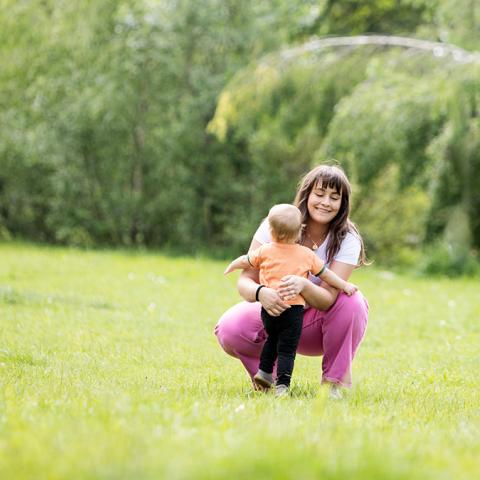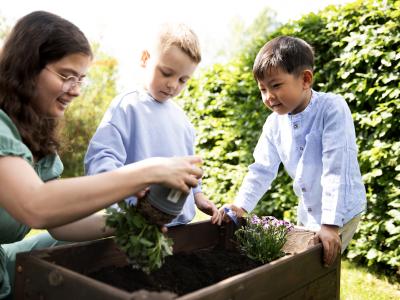
Quality is the basis of our pedagogy
Our pedagogical standards – what defines our work
Our educational standards underline the high quality of our work: they have been developed over many years in practice and apply to all Wichtel Akademie facilities. This enables us to ensure that all our daycare centers implement our high pedagogical standards. The standards serve our facilities as a basis on which they can build their educational work.
Get to know our pedagogical standards
Security and relationship-based care – for positive development
Security is one of the basic human needs and is essential for a child's positive social-emotional, cognitive and motor development. By definition, security includes safety, protection and invulnerability as well as closeness, calm and peace. If a child feels secure, it experiences a positive emotional mood. This positive basic mood is the foundation for a coherent self-concept and the child's mental health.
The morning circle – a ritual that provides security
Young children can only predict to a limited extent what awaits them every day. Recurring rituals give them stability and orientation so that they can find their way around in everyday life and in their environment. One of these safety-giving rituals in everyday pedagogical life is the morning circle: every morning, our pedagogical staff form a circle with the children and welcome the new day together. They use the morning circle for singing and storytelling, to develop project ideas or to celebrate birthdays and festivals. By structuring the daily routine with the children, our educational staff offer them predictability - and therefore security.
Sleeping and resting – under professional supervision
Restful sleep is one of the basic human needs and is essential for health, well-being and growth. Fixed sleep and rest times are therefore an important part of our daycare center routine. Our educational staff provide professional support for young children so that they can fulfill their need for sleep and rest. In doing so, we take into account different biological, cultural and family backgrounds.
Settling in to daycare – mastering the transition gently
When a child comes to crèche, this is a formative moment in their life.
We attach great importance to making the settling-in process as gentle as possible. We give your child as much time as they need to settle in well with us. We have developed a pedagogical guideline for settling in at our daycare centers that is based on the latest scientific findings.
The leap from crèche to kindergarten – smoothly and without fear
The transition from crèche to kindergarten is an important transition in early childhood. We plan this step early on and accompany it with intensive communication between the educational staff, the parents and the child. In this way, we ensure that the transition to kindergarten is smooth and seamless.
Drop-off and pick-up situations – time for good conversations with parents
We use professional drop-off and pick-up meetings for transparent information and communication with you as parents. They are therefore the key to a successful educational partnership between our educational staff and parents. Here you can inform us about all events in your child's life that are relevant to everyday life at the daycare center. In this way, you provide our educational staff with valuable information on how to support your child. Successful handover meetings also enable children to make a safe transition from home to daycare and from daycare to home.
Prepared environment – space to discover and learn
A child-friendly room design with adequate opportunities for movement has a significant impact on a child's mental development. This is because children who feel safe in their environment can pursue their urge to discover and actively explore the space. This requires continuous interaction between the child and its environment - the room becomes a kind of "reference person". This enables independent and self-directed learning as well as the acquisition of skills - the child becomes an active learner. We create learning islands for the children and make sure that these offer enough opportunities for development.
Eating and drinking – enjoyment has to be learned
After all, shared meals at the daycare center are important educational activities that offer the children a wide range of learning opportunities. The daily ritual brings the children together and develops their language and social skills as well as their fine motor skills and independence. Mealtimes also offer the opportunity for intensive sensory experiences. We ensure that the children practise their eye-hand coordination, graphomotor skills and fine motor skills while eating by providing them with a set of complete cutlery. The children decide what to use and how to use the cutlery. They do this on their own initiative and decision. This strengthens their sense of self-efficacy. Each child decides independently and without coercion what they want to eat and scoops the food onto their own plate. The children learn to listen to their gut feeling at mealtimes, so that eating together becomes a time of enjoyment.
Observation and documentation – the basis for individual educational support
Systematic observation and documentation of the child in everyday daycare is the basis of our educational work. They enable our educational staff to individually accompany and support the children in their learning and development processes. Based on the results of the observations, our specialists focus on the strengths, skills and interests of your child. At the same time, the observations and documentation also form the basis for discussions with parents, for exchanges within the team and for reflecting on our educational activities. We hold development meetings with parents at least once a year. In preparation, the children are observed using an age-appropriate development sheet.
Preparing for school – stronger for the first day of school
We prepare children for school and life from the first day of nursery to the last day of kindergarten: Throughout their time at crèche, your child will learn important emotional, social, motor and cognitive skills that will help them to meet the demands of elementary school later on. The better we prepare our "school hoppers" for the leap to school, the easier the transition will be for them. We take great care to ensure that the children are not overwhelmed at nursery. Creating pressure to perform in kindergarten would be counterproductive and would curb the child's natural curiosity and thirst for knowledge. For us, the focus is on gentle preparation for school.
Kommunikation – für ein wertschätzendes Miteinander
Für uns hat eine professionelle Kommunikation mit Ihnen als Eltern, innerhalb unserer Kita-Teams und natürlich auch in unserer pädagogischen Arbeit oberste Priorität. Der zentrale Mittelpunkt positiver Beziehungen ist eine wertvolle Kommunikation. Stimme, Gestik, Mimik und Körperhaltung sind immer Teil von Interaktionen.
Um unsere Kommunikation stets weiterzuentwickeln, beachten wir in unserer Arbeit verschiedene Aspekte und Regeln. Durch ein optimales Vorleben eines wertschätzenden Sprachgebrauches lernen die Kinder, dass dies der Schlüssel zu einem gelungenen Miteinander ist.
Sustainability runs through all pedagogical standards

For us, sustainability is the foundation of all educational activities. That is why we have implemented the topic in all educational standards since 2016 and have been constantly developing it ever since. We understand sustainability to mean a humanitarian and holistic attitude towards all living beings and our (environmental) environment.
Empathy, compassion and an understanding of ourselves as part of the environment are the driving force behind all our actions. We call this the "heart level". And we are convinced that only those who understand themselves as part of the big picture and of nature can act holistically and sustainably.